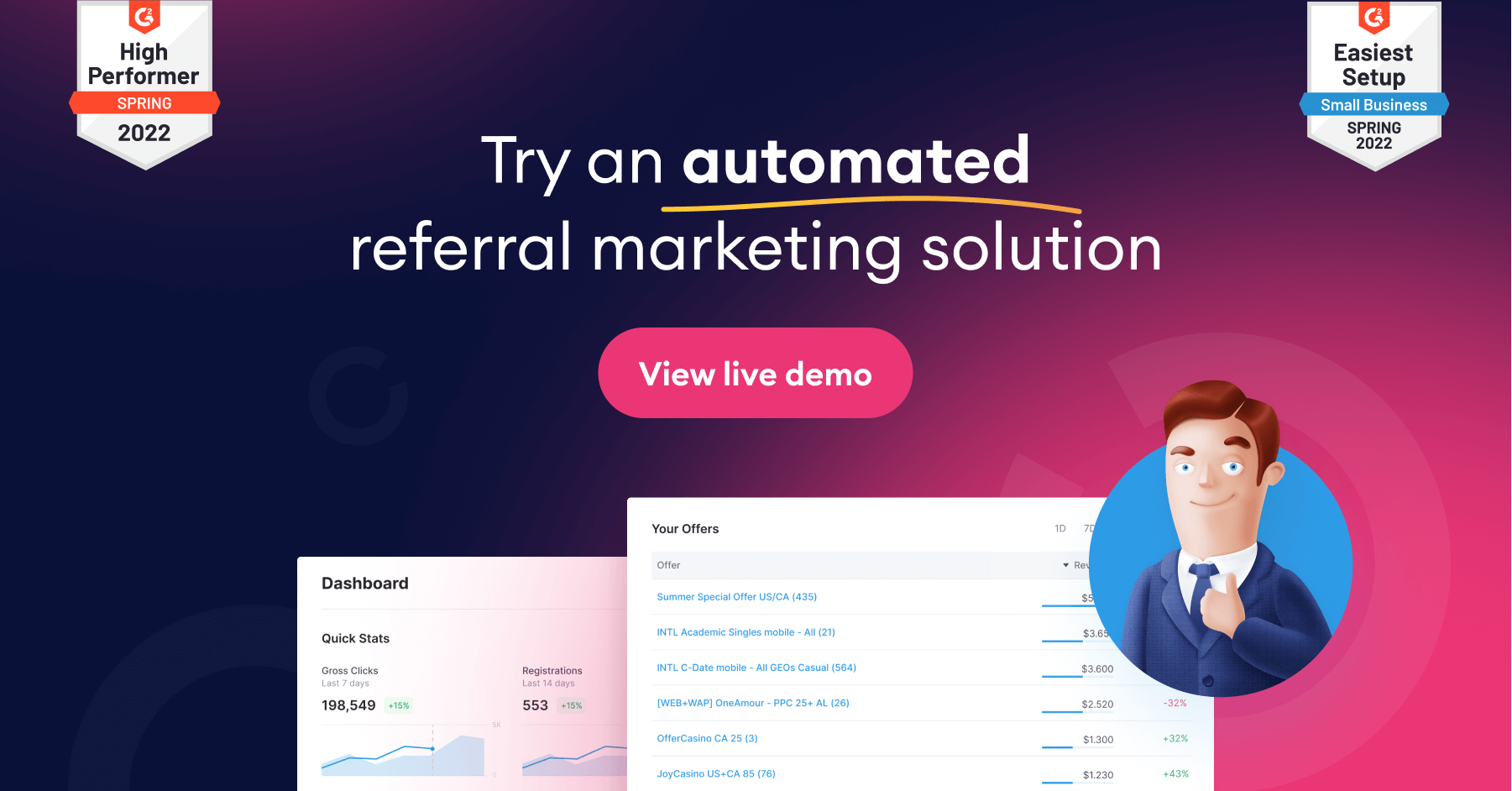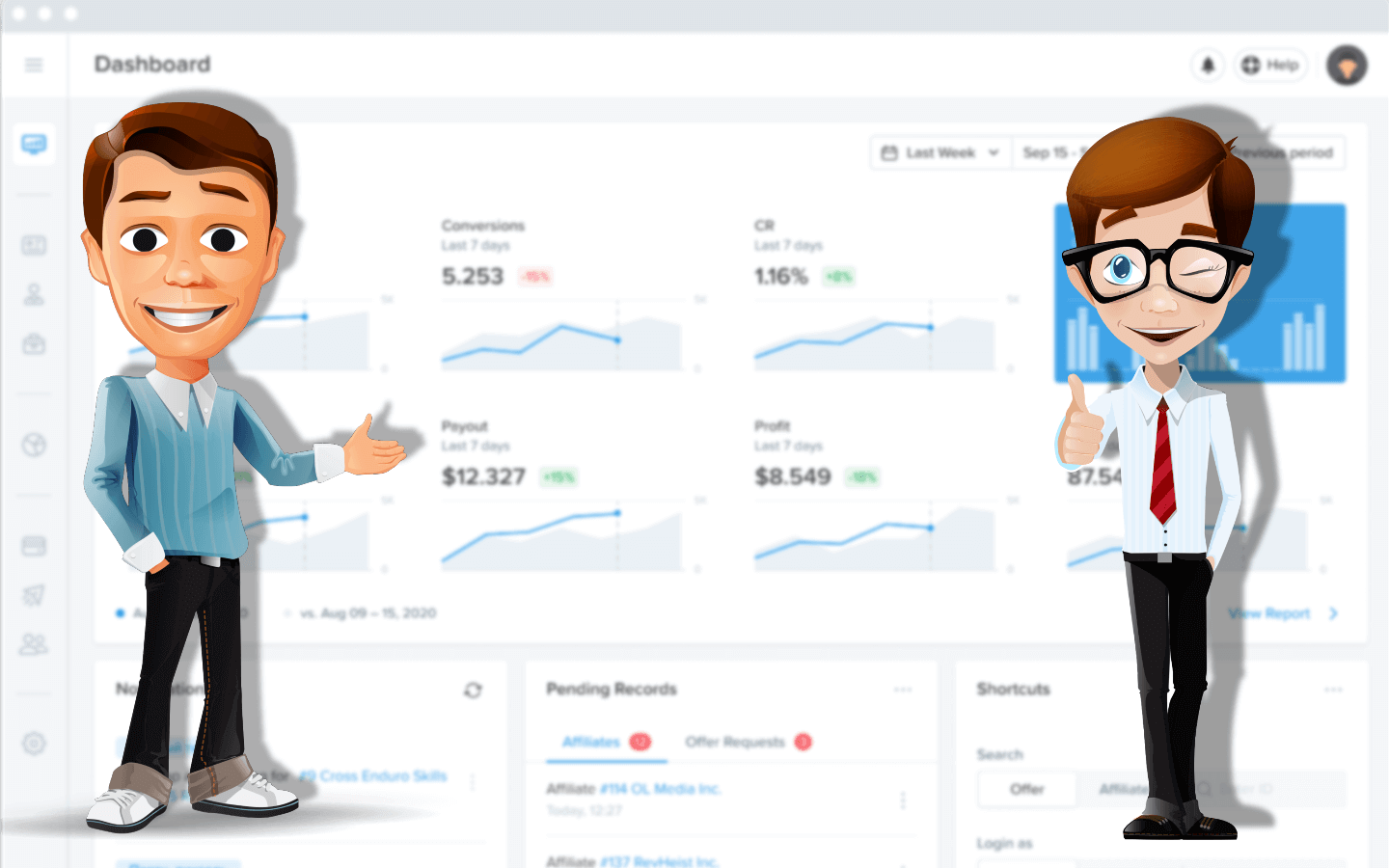Are you looking for ways to boost your business but don’t know where to start? Have you considered a B2B referral program? Referral marketing is a powerful tool that can help you skyrocket your business growth. By incentivizing your customers to refer new customers to your business, you can create a steady stream of leads that are more likely to convert into paying customers.
In this article, we’ll explain the importance of a B2B referral program and how it can help boost your business. We’ll explore successful B2B referral strategies, the power of referrals in B2B marketing, and how to create an effective B2B referral program. We’ll also provide tips on building lasting relationships through referrals, boosting brand awareness, and increasing sales.
Lastly, we’ll guide you on measuring and tracking the success of your referral program, overcoming common challenges, and implementing best practices for maximum success.

By the end of this article, you’ll have a comprehensive understanding of implementing a successful B2B referral program that drives new leads, increases sales, and ultimately boosts your business growth. So, let’s get started!
The Power of Referrals in B2B Marketing
B2B marketing is all about building relationships, and there’s no better way to do that than through referrals. Word-of-mouth recommendations are powerful, and they bring with them a level of credibility that can’t be achieved through other forms of advertising.
So how do you tap into the power of referrals in your business marketing efforts?
Here are some strategies for driving B2B referrals and maximizing the success of your referral program:
Create a Referral Incentive Program
You want to make it worth your customers’ while to refer you to others. Consider offering a discount on your product or service, or a cash reward to customers who refer new business to you.
Make sure the incentive is attractive enough to encourage participation but not so large that it will eat into your profits.
Provide Exceptional Customer Service
The key to getting referrals is to provide exceptional customer service. Your customers won’t refer you to others if they don’t feel confident that you’ll care for their friends or colleagues. Your customer service should be top-notch and be responsive to any questions or concerns your customers may have.
Ask for Referrals
Don’t be afraid to ask your customers for referrals. Let them know that you appreciate their business, and that you’re looking to grow your customer base. Make it easy for them to refer you to others by providing them with a referral form or link.
Make Referrals Easy
When a customer refers someone to you, make it as easy as possible for that person to become a customer. Provide clear information about your products or services, and make it easy for them to sign up or make a purchase. The easier you make it for new customers to get started, the more likely they’ll be to stick around.
You can dramatically increase your B2B marketing success by tapping into the power of referrals.
Remember these strategies as you build your referral program, and watch your business grow!
Creating an Effective B2B Referral Program
Creating an effective B2B referral program is crucial for businesses looking to boost their growth and increase their customer base. Companies can tap into the power of word-of-mouth marketing and gain a competitive edge by creating a program that incentivizes satisfied customers to refer new businesses.
Step 1: Set Your Goals
Before diving into creating your program, it’s important to set clear goals. Determine what you hope to achieve through the program and what metrics you’ll use to measure success. This will direct your program strategy and help you track results as you go.
Step 2: Create an Incentive Structure
The success of your B2B referral program hinges on your incentive structure. Determine what rewards you’ll offer customers who refer new business, and keep your incentives aligned with your goals.
Consider offering a range of rewards, from discounts on future purchases to cash bonuses.
| Incentive | Examples |
|---|---|
| Discount on future purchases | 10% off the next purchase |
| Cash bonus | $100 for each referral that converts to a sale |
Step 3: Promote Your Program
Once you’ve created your program and incentive structure, it’s time to promote it to your customers. This can be done through email campaigns, social media posts, and even in-store signage. Be sure to highlight the program’s benefits and make it easy for customers to refer new business.
- Email campaigns
- Social media posts
- In-store signage
Step 4: Measure Success
Measuring the success of your referral program is crucial for ensuring its long-term sustainability. Determine what metrics you’ll use to track program success and regularly analyze your results. Use this data to refine your program and make it even more effective over time.
- Number of referrals generated
- The conversion rate of referrals
- Average order value from referral sales
Building Lasting Relationships through B2B Referrals
One of the greatest benefits of a referral programs in the business sector is the opportunity to build long-lasting relationships with clients and partners. By providing exceptional services and products, businesses can earn trust and loyalty from customers who are more likely to refer others to their network.
So how can you increase the number of referral leads generated? Below are some tips:
| Tip | Description |
|---|---|
| Nurture Relationships | Regularly check in with clients and partners to maintain a relationship. Send them personalized messages or emails on special occasions such as anniversaries or birthdays. |
| Provide Exceptional Service | By going above and beyond for your clients, you create a lasting impression encouraging them to refer others to your business. |
| Offer Unique Incentives | Consider offering additional incentives such as exclusive discounts or rewards for successful referrals. This will show appreciation for your clients and encourage them to refer more frequently. |
Building robust relationships takes time and effort. However, by investing in client care, businesses can increase their chances of receiving high-quality referrals and building a reputation for trust and reliability.
Boosting Brand Awareness with Referral Programs
B2B referral programs can be a game-changer for brand awareness by turning satisfied customers into brand ambassadors, businesses can generate positive word-of-mouth and increase visibility in their target market.
It’s is a powerful tool that can help companies reach new audiences and expand their customer base. By leveraging the power of personal recommendations, businesses can tap into a network of potential customers that may be hard to reach otherwise.
| Benefits of B2B Referral Programs for Brand Awareness |
|---|
| Increased brand visibility through positive word-of-mouth |
| Expansion into new networks and markets |
| Developing brand ambassadors and loyal customers |
When incentivizing referrals and nurturing participant relationships, businesses can maximize the impact of their referral program and see a significant boost in brand awareness.
Increase Sales through B2B Referrals
This is the most obvious part. More new customers inevitably lead to increased revenue.
The key to success in B2B referral programs is to focus on building strong relationships with customers and partners. Ensure their experience with your business is positive, and they feel valued. This will increase the likelihood of them recommending your business to others.
It’s important to incentivize referrals to encourage participation. Consider offering discounts, rewards, or other incentives for successful referrals. This will make your program more attractive and motivate participants to refer others to your business.
Another effective strategy is to promote your referral program through various channels, such as your website, social media, and email newsletters. Make it easy for participants to refer others by providing clear instructions and user-friendly referral forms.
To maximize the impact of your B2B referral program, be sure to track and measure its success. Use tools such as referral software to monitor and analyze the number and quality of referrals generated. This will help you identify areas where you can optimize your program for maximum success.
In summary, implementing a B2B referral program can help businesses increase their sales by tapping into the power of word-of-mouth recommendations. By building strong relationships with customers and partners, incentivizing referrals, and tracking program success, businesses can unlock the full potential of referral marketing and drive revenue growth.
The Power of Referrals in B2B Marketing
Referrals are a powerful tool for businesses, especially in B2B marketing. Word-of-mouth recommendations are highly credible and can drive significant business growth. In fact, studies show that B2B businesses that implement a referral program can increase their conversion rates by up to 70%.
The key to successful B2B referral strategies is to create a program that incentivizes and encourages customers to refer their business contacts. Incentives can be in the form of discounts, exclusive access, or other rewards.
Maximizing the success of a B2B referral program involves identifying the right customers to target and building strong relationships with them. This means providing exceptional customer service and delivering a high-quality product or service.
Measuring and Tracking Referral Success
Tracking the success of a B2B referral program is crucial to optimizing its impact. Key metrics to monitor include the number of referral leads generated, the conversion rate of those leads, and the revenue generated from those conversions.
There are tools available that can help businesses track and analyze their referral program’s success. Google Analytics, for example, can be used to track the source of website traffic and conversions, allowing businesses to measure the impact of their referral program.
| Key Metrics to Monitor | Tools to Use |
|---|---|
| Number of referral leads generated | CRM software |
| Conversion rate of referral leads | Website analytics tools |
| Revenue generated from referrals | Accounting software |
By tracking these metrics and adjusting the program as needed, businesses can optimize their B2B referral program for maximum success.
The Power of Referrals in B2B Marketing
Referral marketing is a powerful tool for businesses of all types, and B2B referrals are no exception. The impact of word-of-mouth recommendations cannot be understated, and their credibility towards a business is invaluable for driving new customers and revenue.
When it comes to B2B referrals, the stakes are even higher, as the decision-making process is often more complex and involves multiple stakeholders. A referral from a trusted source can go a long way in winning over potential clients and partners.
So, how can businesses effectively drive B2B referrals and maximize program success? The key is to implement successful B2B referral strategies.
Overcoming Challenges in B2B Referral Programs
While B2B referral programs can provide significant benefits, they are not without their challenges. One common issue is low participation rates, as referral programs are often viewed as time-consuming or complicated. Additionally, ensuring program sustainability can be a challenge, as program momentum can quickly fade if not properly managed.
The first step to overcoming these challenges is to simplify the referral process as much as possible. This means providing clear instructions on how to refer others and offering easy redeeming incentives. It’s also important to communicate the value of the referral program and its potential impact on business growth.
Another important factor in program success is ensuring ongoing engagement and communication with program participants. This can be achieved through regular updates on program progress, providing feedback on referred leads, and offering additional incentives for ongoing participation.
Best Practices for a Successful B2B Referral Program
Implementing a successful B2B referral program requires careful planning and execution. Here are some best practices to consider:
- Set clear goals: Define what you want to achieve with your referral program and establish key performance indicators (KPIs) to track your progress. This will help you stay focused and measure your success.
- Create incentives: Offer rewards that motivate your customers to refer your business to others. Consider offering discounts, free services, or other perks for successful referrals.
- Promote your program: Spread the word about your referral program through email campaigns, social media, and other marketing channels. Make it easy for your customers to participate and refer others.
- Nurture relationships: Build strong customer relationships by providing excellent service and maintaining regular communication. This will increase their loyalty and encourage them to refer more business to you.
- Track and measure: Use tools and metrics to track your referral program’s success. Monitor your KPIs and adjust your program as needed to optimize results.
- Stay engaged: Keep your customers engaged with your brand by regularly communicating with them through newsletters, promotions, and other content. This will help maintain top-of-mind awareness and encourage ongoing referrals.
- Encourage feedback: Ask your customers for feedback on your referral program and use their input to improve it. This will demonstrate that you value their opinion and help you identify areas for growth.
- Stay committed: Referral programs take time to build and require an ongoing commitment. Stay in the course and invest in your program for the long term to see the best results.
By following these best practices, you can create a successful B2B referral program that drives new business and increases revenue for your company. Remember, the key is to be patient and persistent – and to always focus on delivering value to your customers.
Conclusion: Skyrocket Your Business with a B2B Referral Program
You should now understand the importance of implementing a B2B referral program for your business. Referral marketing has proven to be a powerful tool for driving growth, increasing sales, and boosting brand awareness.
If you’re not already implementing a referral program, it’s time to start. With the tips and strategies outlined in this article, you can create an effective B2B referral program that drives results.
Remember to build strong relationships with your customers and incentivize them to refer new business. By tracking and measuring your program’s success, you can optimize it for maximum impact and overcome any challenges that arise.
Take Action Today
Why wait?
Let us help you lay the groundwork for your B2B referral program now. Our specialized expertise makes us confident we can provide you with a white-label referral solution tailored to your needs. By harnessing the power of your satisfied clients, we can transform them into formidable brand promoters, amplifying positive feedback and propelling your business forward.
Add a referral program to your business.
Try Scaleo free for 14 days, and see what it can do for your business. Embark on this journey of growth and watch your sales skyrocket!

Last Updated on November 28, 2023





